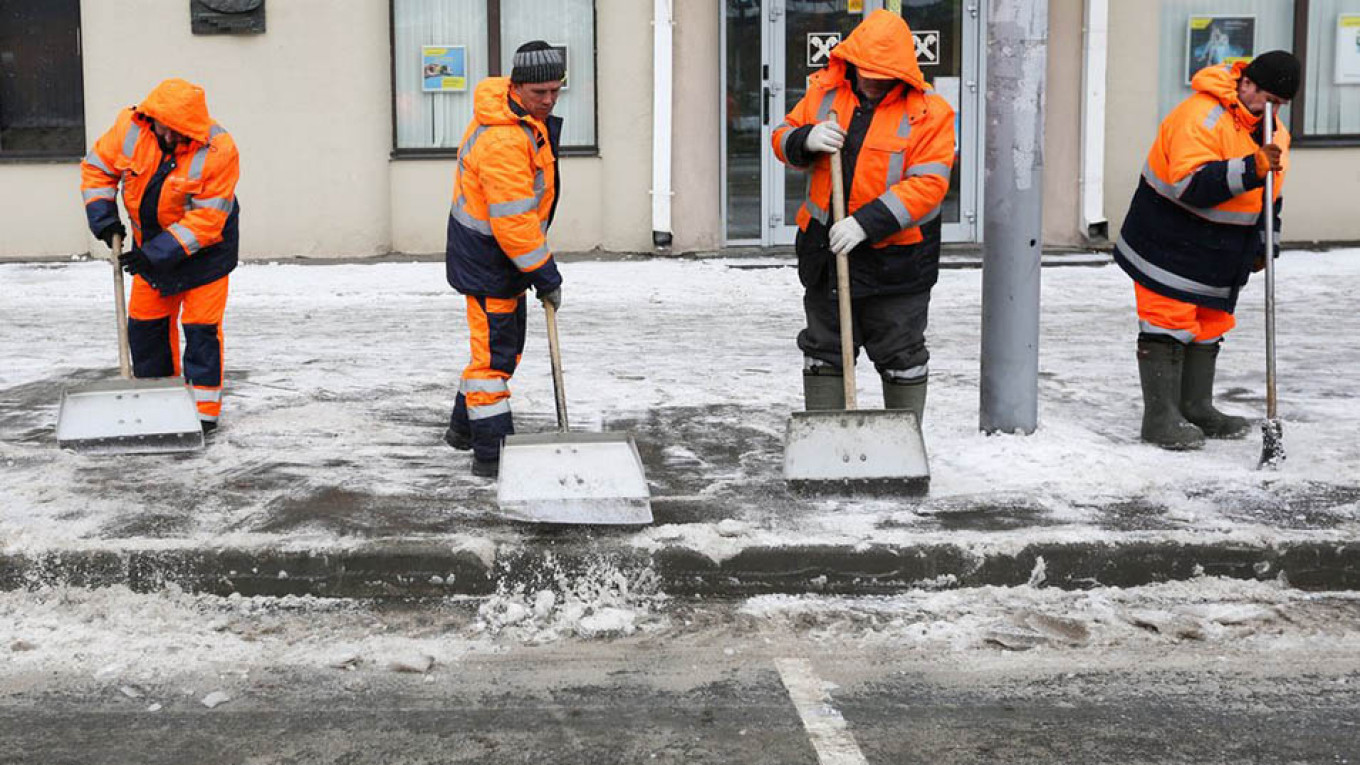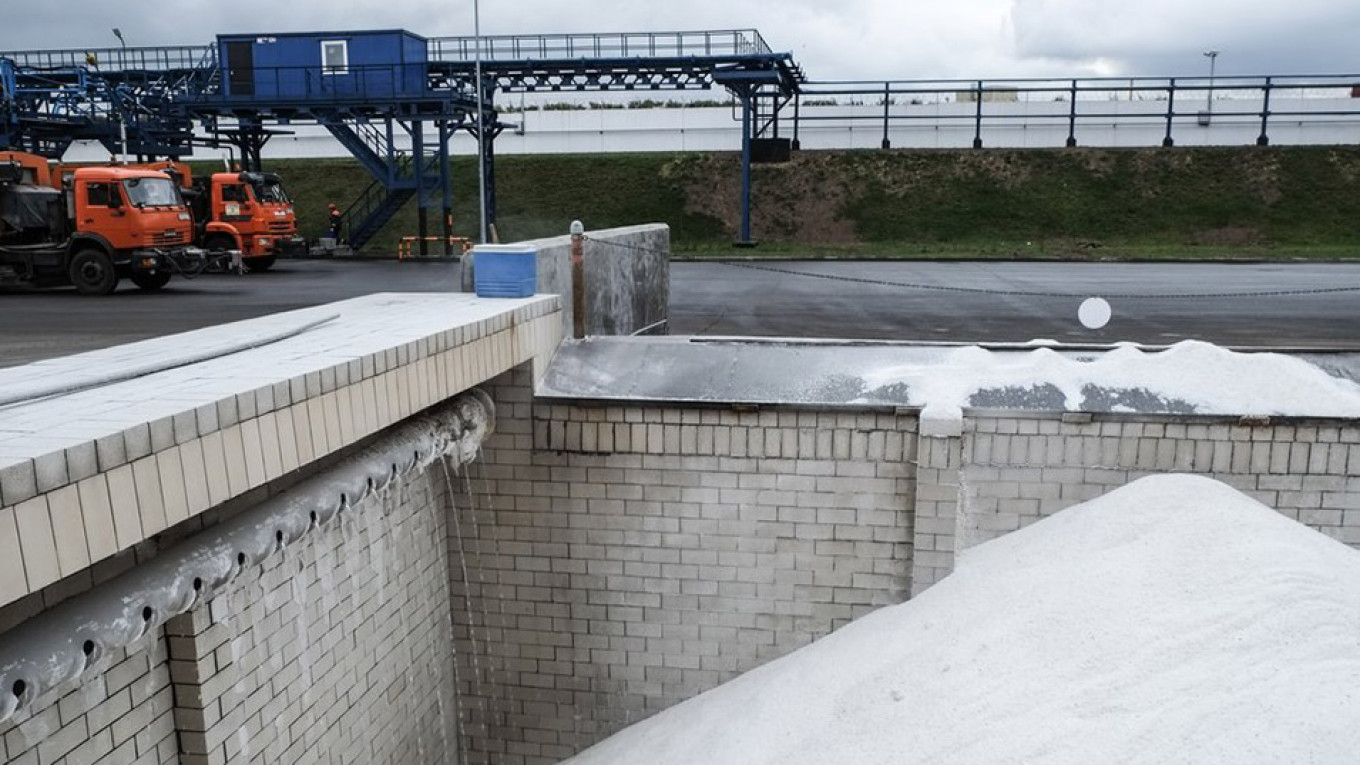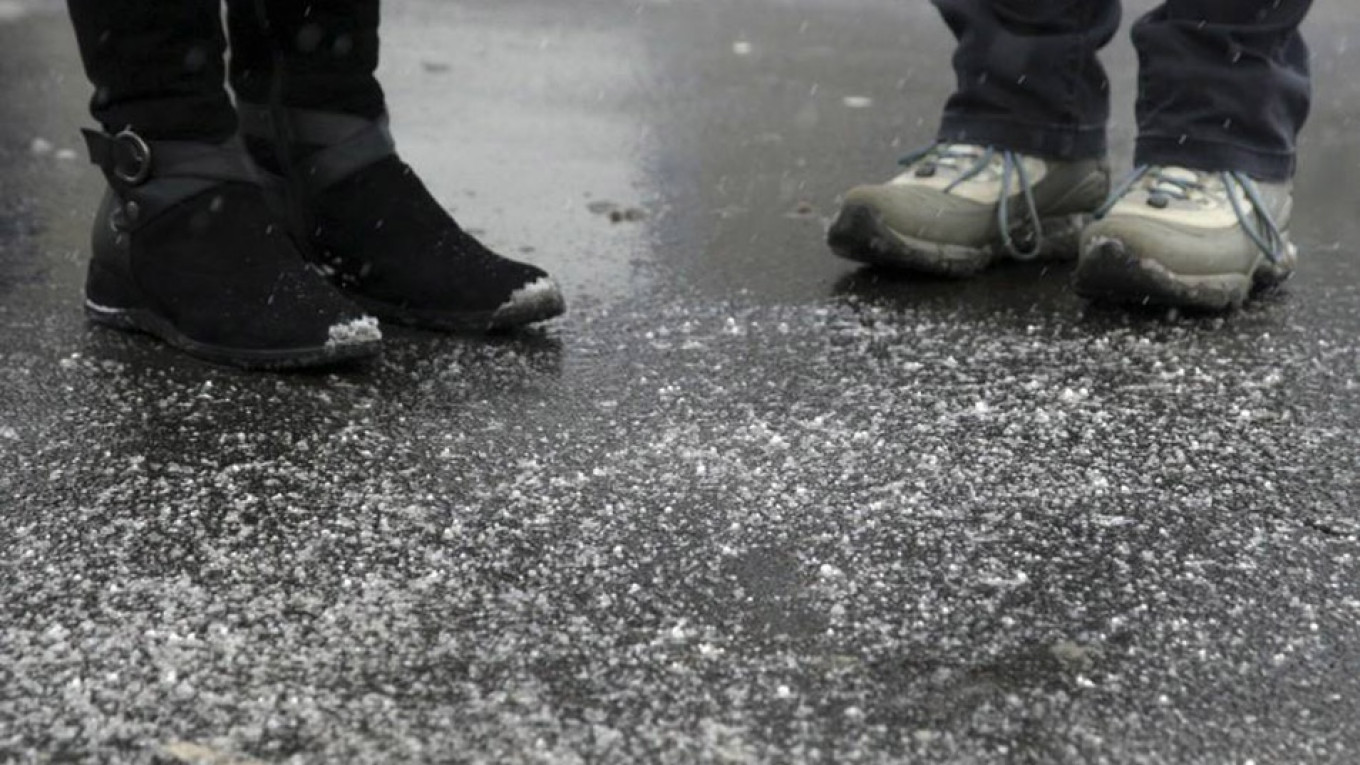Even before the first proper snowfall in Moscow, there is a gravelly crunch underfoot.
It starts in that dim purgatory of late November, after the city has bid farewell to fall and just before the snow flurries become blizzards. The days are short; the moods sour.
“We battle against this every winter,” sighs Moscow deputy Irina Galyamina.
The battle is against salt — specifically, the kind used to clear the 150 centimeters of snow that falls on Moscow every year.
On first glance, the salt seems like a magic cure. Because of it, there are fewer traffic accidents and fewer falls that result in broken limbs. But for some Moscow residents, the drawbacks are more apparent.
Visit any anti-salt group on social media — yes, there are many — for a sampling of their grievances: It turns fresh white snow into a black sludge. It corrodes expensive footwear, car exteriors and pets’ paws. It exacerbates or causes allergies and bronchitis.
Most of the complaints are run-of-the-mill; other posts seem dramatic.
“I foolishly left home an hour-and-a-half ago without a respirator,” reads one recent post by a user named Catherine Denezhkina. “By the time I reached my destination, a seizure was already in full swing. My muscles were trembling, my legs were weak and my reasoning was clouded.”

But the debate over salt isn’t just unfolding between those who might be dismissed as crabby residents. It has also struck a chord among those in the upper echelons of society.
Last week, Moscow deputy Ilya Yashin released a video investigation claiming that the city’s mayor, Sergei Sobyanin, is “poisoning Muscovites.” The real reason for the salt, he said, was so City Hall can award lucrative contracts to the companies that produce it.
The city this year increased its spending to six billion rubles ($88.7 million), up a billion from last season and another billion from the year before, Yashin asserted. This comes as official meteorologists said that temperatures in Moscow this winter have hit record highs because of climate change.
The corrupt way City Hall awards contracts, Yashin says in the video, means Russia isn’t employing crumbled granite like in Finland, heated roads like in Norway, or just cleaning roads thoroughly like in Germany.
In a column titled “Street Salt As a Universal Symbol of Moscow,” Kirill Kharatyan, an editor for the Vedomosti business daily, argued that the salt is the pinnacle of City Hall’s attempts to brush aside Moscow’s problems.
But is there any truth to the harms that detractors say street salts pose?
At Pushkin Square in the city center on Tuesday afternoon, everyone seemed to have an opinion.
"I've heard people say my car is corroded because of road salt, but I don't know if that's true," said construction worker Shamil Saidov, 46. (A science columnist for an outlet in New Hampshire, a U.S. state which also deals with heavy snowfall, asserts that road salt is indeed the culprit.)
Lyuda Kuropyatnikova, 22, complained that her dog’s paws suffer from lesions, sometimes to the point of bleeding. “I rub balm on her paws before we go for walks, but it doesn’t fully help,” she said.
Nearby, a policewoman waiting for her German Shepherd to relieve itself took a more ideological stance on the salt issue: “She feels it,” the policewoman said of the dog. “But she’s strong and it doesn’t bother her.”
In a 2011 interview, a professor in Moscow State University’s chemistry department, was diplomatic. “[The salt] is not the most dangerous, but also not the safest substance: strong concentrations can irritate the skin,” he said. “It is therefore not advised to walk barefoot on it, and shoes will suffer the same way as from all other salt solutions.”

Rita Denisova, 28, and Anya, a 53-year-old city worker, began arguing when Denisova overheard Anya telling a Moscow Times reporter that she wished she could use salts to clean the square, noting that she had shoveled the square five times since 4 a.m. for minimal pay. (The substance is forbidden there.)
“Do you know how bad that stuff is for kids?” asked Denisova, a teacher.
“What about us?” Anya retorted.
In 2016, a local environmental NGO released a report answering Denisova’s very question. “As it turns out, the substances themselves are not as dangerous as some people worry,” the report concluded.
Reached by phone, a co-author of the report, Mikhail Antonov, noted that 2013 reports of radioactive substances found in the city’s street salts led authorities to pull out the stops to placate residents. A city official even consumed the substance on state television to prove its safety.
What about getting rid of it altogether? Residents in St. Petersburg were delighted when the city banned the salt in 2015. One local blogger extolled the whiter snow and more careful drivers.
“Everybody suddenly became super helpful and started letting each other pass,” he wrote. “People are driving more carefully because you can’t speed more than 40 kilometers per hour on snow that has been packed down.”
Roszimdor, Russia’s Winter Road Maintenance Association, however, described the results as “monstrous.” Traffic accidents that winter had doubled, the association reported, and some 1,000 people were injured after slipping on sidewalks.
“It is time to recognize that we can’t go without street salts,” Roszimdor wrote. “We just need to apply them correctly and wisely.”
A Message from The Moscow Times:
Dear readers,
We are facing unprecedented challenges. Russia's Prosecutor General's Office has designated The Moscow Times as an "undesirable" organization, criminalizing our work and putting our staff at risk of prosecution. This follows our earlier unjust labeling as a "foreign agent."
These actions are direct attempts to silence independent journalism in Russia. The authorities claim our work "discredits the decisions of the Russian leadership." We see things differently: we strive to provide accurate, unbiased reporting on Russia.
We, the journalists of The Moscow Times, refuse to be silenced. But to continue our work, we need your help.
Your support, no matter how small, makes a world of difference. If you can, please support us monthly starting from just $2. It's quick to set up, and every contribution makes a significant impact.
By supporting The Moscow Times, you're defending open, independent journalism in the face of repression. Thank you for standing with us.
Remind me later.







